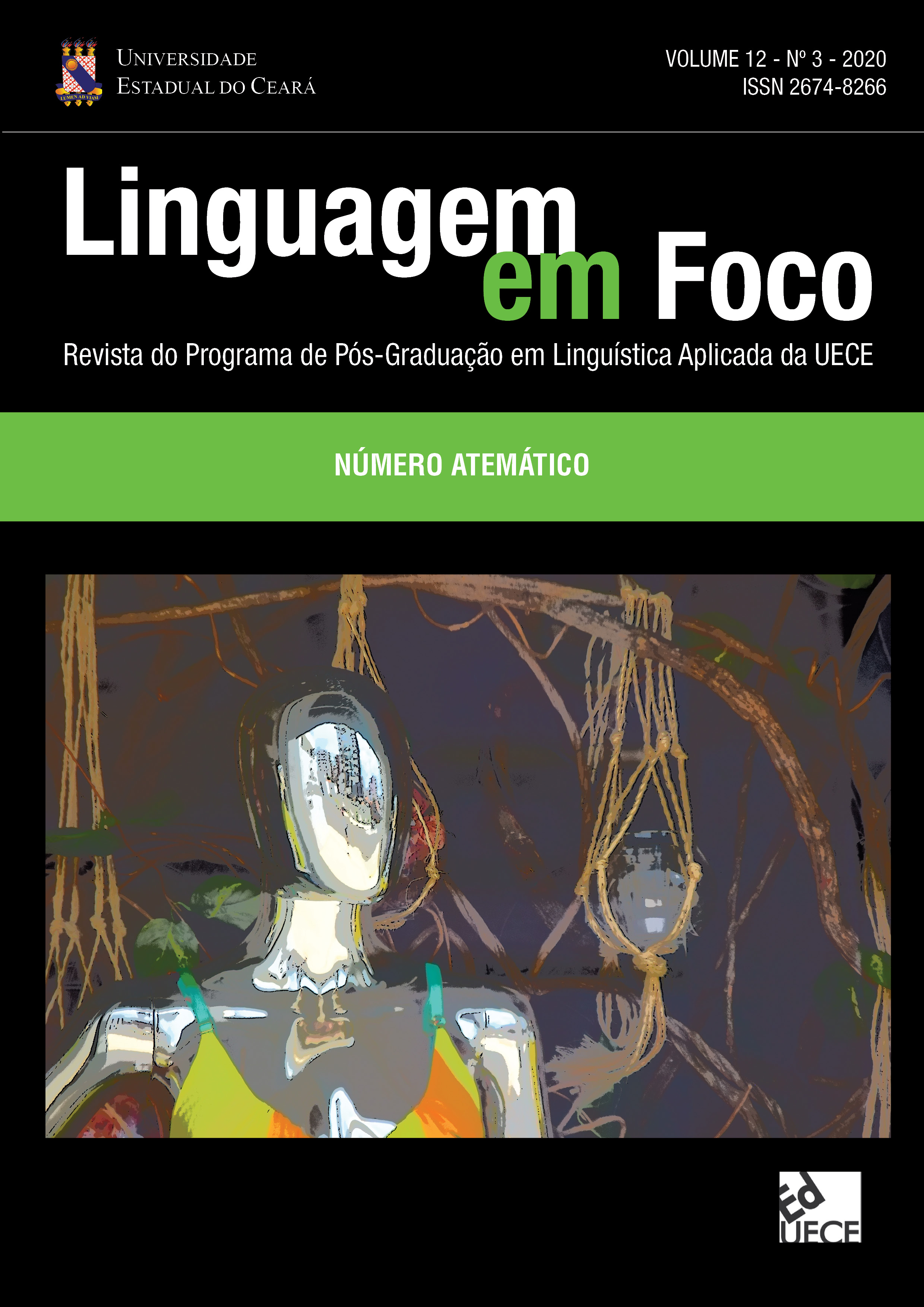“Acho que a escrita é fundamental”
Representações de professores de língua portuguesa sobre o com trabalho produção textual na escola
DOI:
https://doi.org/10.46230/2674-8266-12-4337Palavras-chave:
Interacionismo Sociodiscursivo, Trabalho Docente, EscritaResumo
O presente artigo tem como objetivo discutir relação existente entre o ensino de produção textual escrita e as representações de professoras de Língua Portuguesa sobre o ensino dessa competência na escola. A fundamentação teórica deste trabalho encontra-se, majoritariamente, no quadro teórico-metodológico do Interacionismo Sociodiscursivo (BRONCKART, 1999; 2006; 2008). Para geração de dados, recorreu-se a à realização de entrevistas semiestruturadas, gravadas em áudio, com duas professoras de Língua Portuguesa da rede pública municipal de ensino de um município gaúcho. As análises focaram sobre as representações das professoras acerca do trabalho com produção textual escrita em suas aulas a partir de dois níveis da arquitetura textual propostos por Bronckart (1999): o nível da infraestrutura textual, focalizando a identificação dos tipos de discurso, e o nível da responsabilização enunciativa, especialmente a partir da identificação dos mecanismos enunciativos. Os resultados sugerem que, apesar de as professoras responsabilizarem-se enunciativamente pelo seu agir, ainda há muito o que se avançar em relação ao ensino de produção textual escrita na escola. Considera-se que esta pesquisa contribui para as investigações realizadas nesse campo ao reafirmar a importância de compreender mais a fundo a realidade da sala de aula a partir das representações dos professores para que se possa intervir qualificadamente em seu trabalho de ensino em propostas de formação continuada.
Downloads
Referências
AMORIM, M. “Para uma filosofia do ato: ´válido e inserido no contexto´.” In. BRAIT, B. (Org.) Bakhtin: dialogismo e polifonia. São Paulo: Contexto, 2009.
BAKHTIN, M. Estética da criação verbal. Trad. Paulo Bezerra.4. ed. São Paulo: Martins Fontes, 2003. p. 468.
ERICSON, F. Qualitative methods in reseach on teching. In: WITTROCK, M. C. (Org.). Handbook of research on teaching. New York: MacMillan, 1986. p. 119-161.
_________. What makes school ethnography ‘ethnography’? Anthropology and education quarterly. v. 15, nº 1. Spring, pp. 55-66, 1984.
FRITZEN, M. e LUCENA, M. (Orgs.). O olhar da etnografia em contextos educacionais: interpretando práticas de linguagem. Blumenau: Edifurb, 2012. p. 187.
GRUPO DE NOVA LONDRES. A Pedagogy of Multiliteracies: Designing Social Futures, In: COPE, B.; KALANTZIS, M. (Orgs.). Multiliteracies – Literacies Learning and the Design of Social Futures. New Yourk: Routledge, 2006 [1996], pp. 9-37.
JENKINS, Henry. Cultura da Convergência. 2ª ed. São Paulo: Aleph, 2009. 204.
KINCHELOE, J. L.; McLAREN, P. Repensando a Teoria Crítica e a Pesquisa Qualitativa. In. DENZIN, N. e LINCOLN Y. O Planejamento da Pesquisa Qualitativa: teorias e abordagens. Tradução de Sandra Regina Netz. Porto Alegre: Artmed, 2006. p. 281-314.
OLIVEIRA, A. 2013. Etnografia e pesquisa educacional: por uma descrição densa da educação. Educação UNISIN, v. 17, p. 271-280.
PEREIRA, A.S.; GOMES, L.F. Pedagogia transmídia na educação básica: um projeto de letramento no PIBID sob o enfoque dialógico-discursivo. In: AZEVEDO, I. C. M. de; COSTA, R.F. (Orgs.). Multimodalidade e Práticas de Multiletramentos no Ensino de Línguas. São Paulo: Blucher, 2019. p. 225-248. Disponível em: <https://openaccess.blucher.com.br/article-list/9788580394085-443/list#undefined>. Acesso em: 25 nov. 2019.
ROJO, R.; MOURA, E. (orgs.). Multiletramentos na escola. São Paulo: Parábola Editorial, 2012.p. 261.
STREET, B. Letramentos sociais: abordagens críticas do letramento no desenvolvimento, na etnografia e na educação. São Paulo: Parábola, 2014. p. 237.
THE NEW LONDON GROUP. A Pedagogy of Multiliteracies: Designing Social Futures. 1996. Disponível em: <http://newarcproject.pbworks.com/f/Pedagogy+of+Multiliteracies_New+London+Group.pdf>Último acesso em: 02 jun. 2018.
TODOROV, T. A literatura em perigo. Trad. Caio Meira. Rio de Janeiro: DIFEL, 2017. p. 96.
WINKIN, Y. A nova comunicação: da teoria ao trabalho de campo. Trad. Roberto Leal Ferreira, Campinas, SP: Papirus, 1998. p. 219.
Publicado
Como Citar
Edição
Seção
Licença
Os autores que publicam na Linguagem em Foco concordam com os seguintes termos:
- Os autores mantêm os direitos autorais e concedem à revista o direito de primeira publicação. Os artigos estão simultaneamente licenciados sob a Creative Commons Attribution License que permite a partilha do trabalho com reconhecimento da sua autoria e da publicação inicial nesta revista.
- Os conceitos emitidos em artigos assinados são de absoluta e exclusiva responsabilidade de seus autores. Para tanto, solicitamos uma Declaração de Direito Autoral, que deve ser submetido junto ao manuscrito como Documento Suplementar.
- Os autores têm autorização para disponibilizar a versão do texto publicada na Linguagem em Foco em repositórios institucionais ou outras plataformas de distribuição de trabalhos acadêmicos (ex. ResearchGate, Academia.edu).





























